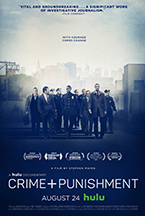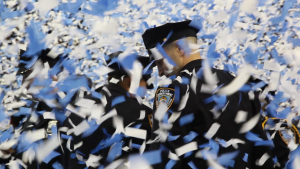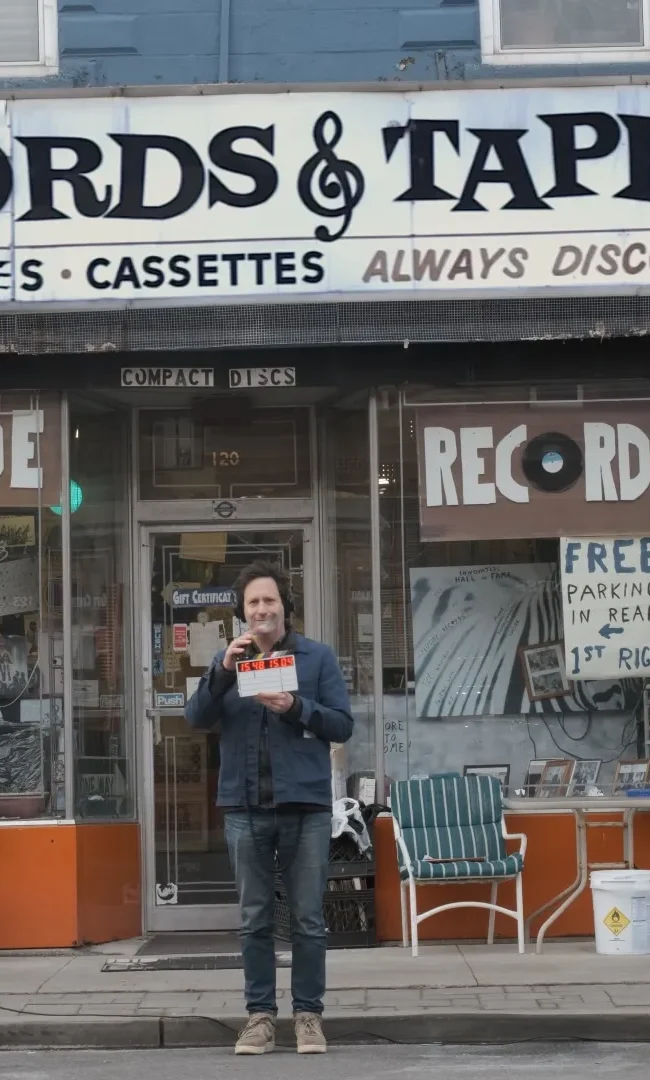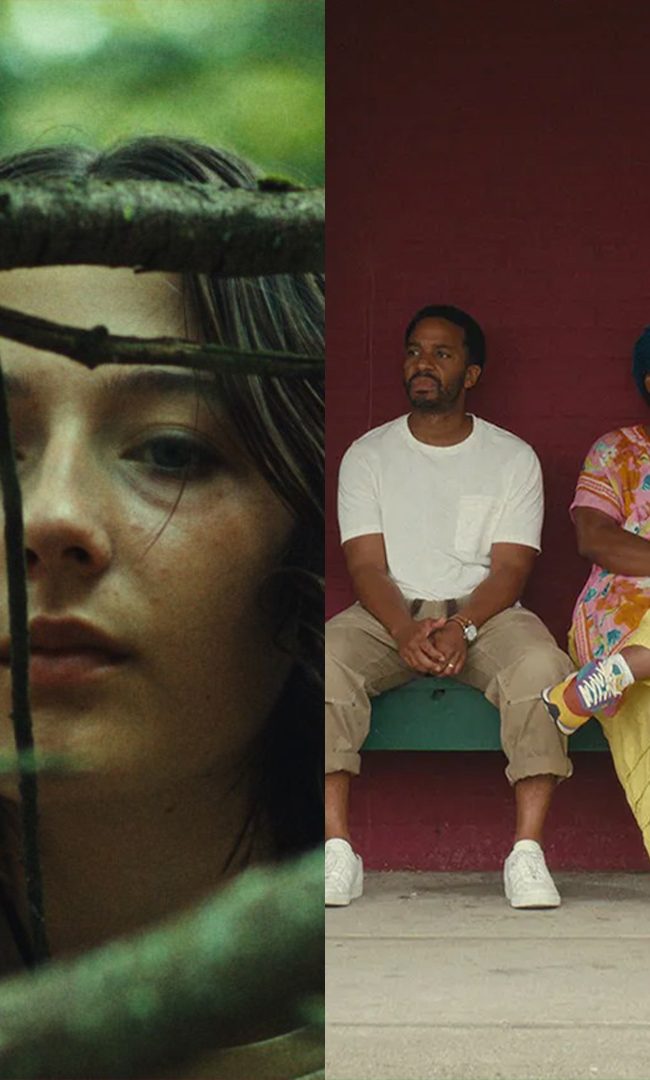A Conversation with Stephen Maing (CRIME + PUNISHMENT)
 I spoke with director Stephen Maing, of the new documentary Crime + Punishment (which I recently reviewed), on Thursday, August 16, 2018, by phone, along with my Fog of Truth podcast colleague Bart Weiss (of Dallas VideoFest). Maing’s film examines the insidious ways in which police supervisors in New York try to force the men and women they employ to arrest as many people as possible (usually poor folks of color) to add money to the city’s coffers. Though it is officially against the rules, these quota systems persist. Some officers (of color) resist, and this is their story. What follows is a condensed digest of our conversation, edited for clarity.
I spoke with director Stephen Maing, of the new documentary Crime + Punishment (which I recently reviewed), on Thursday, August 16, 2018, by phone, along with my Fog of Truth podcast colleague Bart Weiss (of Dallas VideoFest). Maing’s film examines the insidious ways in which police supervisors in New York try to force the men and women they employ to arrest as many people as possible (usually poor folks of color) to add money to the city’s coffers. Though it is officially against the rules, these quota systems persist. Some officers (of color) resist, and this is their story. What follows is a condensed digest of our conversation, edited for clarity.
Hammer to Nail: This film was executive-produced by Laura Poitras, with whom you had previously worked on the Field of Vision short The Surrender . Could you talk about how you became cinematically involved with her and Field of Vision?
Stephen Maing: I met Laura at the Sundance Story and Edit Labs, with a film that I had been working on. This was back in 2010, I believe. I was at the labs with a film called High Tech, Low Life, about two of the first citizen-journalists in mainland China, who were fighting against censorship.
HtN: And that was your first feature, and this is your second, right?
SM: Yes. I had filmed in China for almost five years, following a younger and an older traveling citizen-reporters, who were going around reporting on censored news and trying to stay out of trouble and exposing some really harrowing stories.
HtN: And then from there, how did you get to The Surrender?
SM: Well, after the Sundance Story Lab, Laura became a close advisor and editorial consultant, and we just stayed in touch and she gave some great feedback on cuts. And then, when she started up The Intercept, they talked about wanting to do their first long-form documentary, and so there was discussion about a story that one of the new Intercept reporters had heard about. This story was about a Korean-American State Department analyst who had been charged with violating the Espionage Act for having a conversation with a reporter. This guy was one of the nation’s leading nuclear non-proliferation experts, as well as a regional expert on North Korea, and he was being charged with jeopardizing our national security. So, this was going to be a long-form article that the reporter Peter Maass was going to start looking into, and then there was talk of, “Well, why don’t we make this a film?” So, Peter and I just went down to DC and started working on these projects in parallel.
Bart Weiss: So, these characters you have [in Crime + Punishment] are really fascinating. Could you talk about how you met them and, more importantly, how you got their trust? Because these are people with a lot on the line, and to let you be so close to them for so long is pretty remarkable.
SM: So, Crime + Punishment is actually the fourth project about the criminal-justice system and policing in New York City that my producing partner, Ross Tuttle, and I have done. We had worked on a couple of shorts and a one-hour piece where we got access to and used silhouetted, anonymous law-enforcement sources, with their names redacted and their voices disguised. Those cops were introduced to Ross by an attorney who was working with them on the “stop-and-frisk trial” that was unfolding in Federal Court in New York City.
When we included these officers as anonymous sources in these pieces we were doing over the years, what wound up happening is that they decided to go more transparent and really share their battle with the department, because it really didn’t seem, as 2014 rolled around…which was supposed to be a reform year, with the election of Bill de Blasio on pretty much a police-reform platform, with talk of bringing on a reform commissioner, and everyone thought things were going to change, and they didn’t. And so, what wound up happening was that these guys wanted to really share much more outside of the silhouetted interviews, and so I was drawn by this opportunity to do something truly character-driven and observational about these whistle-blower cops.
What I didn’t know was that other cops would start coming into the fold, like Sandy Gonzalez, whom we see retaliated against for his winter hat, and others, like Ritchie Baez, and then ultimately 12 cops who had formed this class-action lawsuit and then all these other individuals who had been working, intersectionally, on this same issue.

Felicia Whitely from CRIME+PUNISHMENT
BW: It’s pretty remarkable that they were able to talk to you and give you such honest and frank material. It’s one of the things that makes the film really strong. I’m curious, since there have been many films like this, talking about problems in police departments around the country, in Oakland, in Baltimore…do you have a sense that there’s any chance of changing police culture?
SM: You know, I think there are certain kinds of films about policing that can be made, and have value and should be made. One is the kind where we’re getting departmental access: we have access to ride-alongs, roll calls, up-close documentation of people in high ranks. Ross and I were able to do one of those documentaries with the NYPD, which was a one-hour for CNN, and what was very interesting about that process, to me, was that while there were many illuminating things about it, it also, afterwards, made me very sensitive to this idea that you’re also not going to get a counter-narrative when you have direct access to the official narrative.
And so, I was really compelled to do one more project about this subject where we not be asking for any permission, we would not be functioning on the premise of being granted access or not; we were going to create it all, ourselves. In fact, because we had access to these officers who trusted us and knew that we had been very committedly following this issue and their story for several years, already. They were just ready to go.
This is a film about a group of officers who are basically trying to hold the department accountable for reforms that it claims to have made. And it’s going to be a really big moment for law enforcement and communities because, at the end of the day, this is not an anti-cop film. This is a film actually about minority cops who joined because they believed that they could do something positive for the community and believed that there was a noble mission, but found out otherwise.
HtN: There are a number of times in the film where we see your subjects testing out some hidden micro-cameras, either in watches or in pens, before going into meetings with supervisors, where they intend to record those meetings for evidence. We mostly just hear audio of those meetings, however. Why did you not use more of that? Did you have legal concerns, or was the footage just not very usable?
SM: We were very careful about what is and is not legally usable. Luckily, New York is a one-party-consent state. (laughs) Conveniently, only one person needs to know about the recording, and that can be you or the person who is recording it.
HtN: I’ll have to remember that, and only make such documentaries in New York!
SM: (laughs) Exactly! But the idea of the surreptitious recording is one that cops have been employing for years…years before I even came along. And so, I cannot take credit for all the recordings they made. You know, in the situations where you see me in the film handing a watch- or a pen-camera to an officer, that was a result of the officers already wanting to have done the recordings, but not having the means to, and not having the technical know-how. Because I knew it was something that was going to happen, anyway, those are situations in which I felt comfortable intervening. And the choice to include audio or video, that really just depended on what I had access to.
HtN: So, since you said you’ve made some other films with the NYPD, have you, since this was made – and it’s been getting great press – had any pushback from the NYPD, and did you have any during the filming, once they realized that you weren’t making the same kind of film that you had before?
SM: Well, I should clarify: I had worked on this one-hour program, with official access, and that overlapped with this project a little bit. This was a project that I did ask for comment on, which they declined, but this wasn’t something that was dependent on their permissions or access, so those were two very different projects. And in terms of pushback, surprisingly none, not yet.
In fact, what’s been really shocking to me is the number of cops who have been coming up to me and the subjects after the festival screenings and saying, “Thank you so much for sharing your story. Thank you so much for making this film. This has happened to me.” In addition to that, what’s been kind of shocking is that four days after we got back from Sundance with a Social Impact Filmmaking Award – which was pretty neat – the chief of the department put out a memo saying, essentially, “In case anyone is wondering, there is no quota, and there never has been, and people will be disciplined if they enforce one.” And two weeks later, the commissioner doubles down and says, to everybody – all 36,000 uniformed officers – in an internal memo, that they will all be mandated to take no-quota training, and reminded everyone again that there were no quotas.
So, the irony wasn’t lost on us, because at the same time, the president of the NYPD Sergeants’ Union – a fellow named Ed Mullins – had come up to us at Sundance, and he had an entourage of other guys from the union, and we thought, “Holy shit! These guys are here to, you know …” The buck stops here kind of thing! And he walks up and says, “I want to talk to you.” And he pulls me aside. This is right after our first screening. And he goes, “This film is long overdue in New York City. It’s a very good film, and I’m going to support it 1000%, because it’s telling the truth.” He was being sincere because, to this day, he has mobilized his support for this film and the subjects.

BW: So, to go back to the question I asked before, clearly most of the cops who go into this go into it for the right reasons, yet we still keep having this. Do you feel, after spending so much time, with so many people, that we could ever get to a place where one could totally believe that we have honest cops and that the kind of corruption that we see in your film and in other films is a thing of the past?
SM: Well, the thing that I think might make this a slightly different moment is that we’ve never had this voice speak out collectively before: active-duty, whistle-blower cops who have evidence and actually believe in the job and believe it can be done better. So, this is kind of like a really hopeful moment, actually, because a lot of folks have been coming up to me, saying that they could see this being used as a law-enforcement training tool. But at the end of the day, this isn’t a film that’s anti-cop.
Having spoken to so many members of law enforcement over the last 7 years of working on this subject matter, in general, I categorically push back on this question of whether we can have any honest cops or not. It’s not the rank and file, in my observation. It is the policy of the department that forces cops to behave in morally ambiguous ways, at times, or pushes them into contentious relationships with community members. So, I think there are actually many, many good cops out there, on the job, who want to see the mission better aligned with what they were trained to do in the academy.
BW: Well, I’ve always thought that there were cops who wanted to do the right thing, but it just seems as if there’s always a culture, or administration, in any city, any place, for as long as I’ve been alive, where this kind of corruption happens. This film and other films like it really shed light on this and make people understand it in very compelling ways.
HtN: So, I have one last question. Since you shot this film, as well as directed it, which is not that uncommon in the documentary world, yet still poses creative challenges, since you’re doing two things at once, were there any specific challenges that you faced on this film as director and cinematographer? Have you always done that, so it’s just routine?
SM: Well, just to geek out a little bit, I think that in the filming of my films, at least, the cinematography is the single, most prominent concern, and not only because of aesthetic reasons, but also formally, in terms of how we address the fourth wall. You know, there’s this kind of unseen battle being waged between direct cinema and cinema vérité in a lot of documentary projects, and I think that can sometimes pose a problem, but in the case of this project, in the messiness of my whole process, I think I eventually learned that this tussle between “is this an observational film or is this one where you feel the imprint of the maker” was, in fact, the voice. There was this shifting and morphing of modes and genres that was really vital to try and speak powerfully and cinematically to each moment’s different needs.
HtN: Sure! Well, I think it’s really well shot and really well directed and really well edited. Congratulations on the film!
SM: Thank you!
– Christopher Llewellyn Reed (@ChrisReedFilm)











